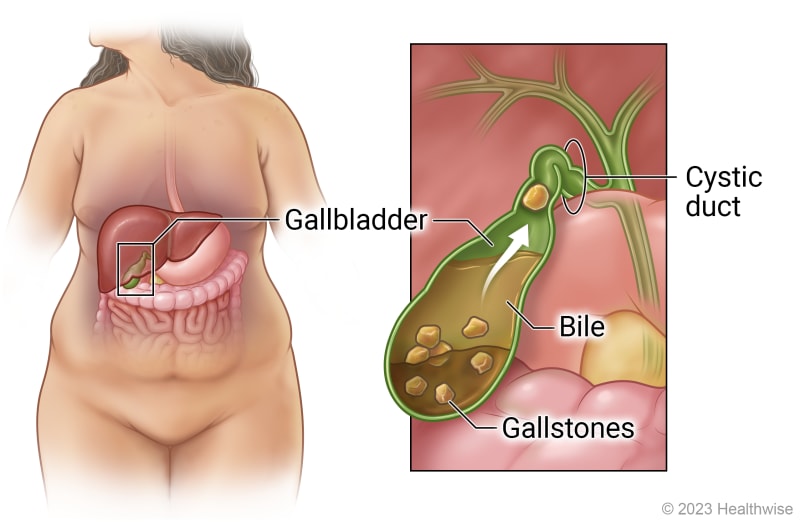Gallstones
Gallstones are small stones that form in the gallbladder or the bile ducts, the tubes that carry bile to the small intestine. They usually don't cause symptoms unless they block the opening to the gallbladder. If that happens, you may have pain in the upper right part of your belly.
If you have a bad attack, or a second attack, you may want to have your gallbladder removed because you are likely to have more attacks.
Symptoms
What are the symptoms of gallstones?
Most people who have gallstones don't have symptoms. When symptoms occur, they can include:
- Pain in the pit of your stomach or in the upper right part of your belly. It may spread to your right upper back or shoulder blade area.
- Pain that may come and go or be steady. It may get worse when you eat.
- Fever, chills, nausea, or vomiting if a gallstone is blocking a bile duct and causing an infection.
- Yellowing of your skin and the whites of your eyes.
Pain can last 15 minutes to 24 hours. Continuous pain for 1 to 6 hours is common. The pain may begin at night and be severe enough to wake you. Pain often starts after eating food that is high in fat. The pain usually makes it hard to get comfortable. Moving around doesn't make the pain go away.
Gallstones

Gallstones develop when cholesterol and other substances in the bile form crystals that become hard stones in the gallbladder. The gallbladder is a small sac located just under the liver. Gallstones can form when too much cholesterol is in the bile or when the gallbladder does not empty properly.
Causes
What causes gallstones?
Gallstones form when cholesterol and other substances found in the bile form crystals that become hard stones in the gallbladder. The gallbladder is a small sac found just under the liver. Gallstones can also form if your gallbladder doesn't empty as it should. Or they can form if you have too much cholesterol in your bile. Too much cholesterol in your bile isn't caused by eating too much cholesterol or having high cholesterol (in the blood).
Being overweight, having obesity, or losing weight quickly may increase the risk of developing gallstones.
Most doctors believe that even microscopic gallstones in the gallbladder can cause symptoms. These tiny stones can form a type of sediment called biliary sludge. It often can be seen on an ultrasound of the belly.
Prevention
How can you prevent gallstones?
You can try to reduce your risk of forming gallstones.
- Stay at a weight that's healthy for you. If you need to lose weight, your doctor and a dietitian can help you make a plan. Losing weight too quickly can increase the risk of gallstones.
- Eat a variety of foods that give you the nutrients you need to stay healthy.
- Get 30 minutes of exercise on most days of the week. For many people, walking is a good choice.
Diagnosis
How are gallstones diagnosed?
If you have symptoms, your doctor will do a physical exam. The doctor will ask you questions about when the pain in your belly started, where it is, and if it comes and goes or is always there. If your doctor thinks you have gallstones, your doctor may order imaging tests or blood tests to confirm the diagnosis.
The most common test is an abdominal ultrasound. A technologist moves a wand across your belly to create pictures on a screen. Blood tests may be done to find out if gallstones are causing other serious problems or if your symptoms are caused by something else.
Treatment
How are gallstones treated?
If you don't have symptoms, you probably don't need treatment.
If you do have symptoms and your first gallstone attack causes pain, your doctor may tell you to take pain medicine and wait to see if the pain goes away. You may never have another attack. Waiting to see what happens usually won't cause problems.
If you have a second attack, you may want to have your gallbladder removed. A second attack means you're more likely to have future attacks. Many people have their gallbladders removed. And the body works fine without a gallbladder.
If you have small gallstones and can't have surgery, you may be able to try medicines that break down gallstones.
Problems
What problems can happen when you have gallstones?
Gallstones can cause many different problems, such as:
- A blockage in the common bile duct.
- Inflammation or infection of the gallbladder (acute cholecystitis). This can happen when a gallstone blocks the cystic duct.
- Inflammation or infection of the common bile duct (cholangitis). This can happen when gallstones get stuck in the common bile duct. In rare cases, this can damage the liver or spread infection.
- Pancreatitis. This is an inflammation of the pancreas.
Self-care
How can you care for yourself when you have gallstones?
- Rest until you feel better.
- Be safe with medicines. Read and follow all instructions on the label.
- If the doctor gave you a prescription medicine for pain, take it as prescribed.
- If you are not taking a prescription pain medicine, ask your doctor if you can take an over-the-counter medicine.
- Avoid foods that cause symptoms, especially fatty foods. These can make the gallbladder tighten and cause pain.
Copyrighted material adapted with permission from Healthwise, Incorporated. This information does not replace the advice of a doctor.
